Genre et inclusion
Au fur et à mesure que les transferts monétaires continuent à se développer, les parties prenantes demandent une meilleure prise en compte des problématiques de genre et d’inclusion car « des transferts monétaires sensibles au genre qui tiennent compte des disparités et répondent équitablement aux besoins de toutes les personnes affectées par une crise ont le potentiel d’avoir un impact positif sur les femmes et les filles en les protégeant davantage et en favorisant leur autonomisation, tout en renforçant les impacts spécifiques au secteur, qui peuvent rendre les ménages et les communautés ayant vécu une crise plus résilient·es et plus autonomes. » (Directives pour le chantier du Grand Bargain sur les transferts monétaires et le genre). La pandémie de COVID-19 a accru l’urgence de l’assistance car elle a affecté les femmes et les groupes exclus en particulier en augmentant la charge de travail de soin, en réduisant les opportunités d’emploi de manière disproportionnée et en exposant les femmes à des difficultés financières plus fortes et à davantage de violences basées sur le genre.
Le CALP Network continue d’ancrer son travail sur le symposium #GenreEtTransfertsMonétaires organisé en 2018 à Nairobi et sur l’engagement inscrit dans le programme pour l’action collective (Agenda for Collective Action) qui en a résulté. Le rapport « La situation mondiale des transferts monétaires en 2020 » fait état de progrès notables en matière de genre et de transferts monétaires, alors que ce domaine était marqué par des lacunes importantes en matière de données probantes dans le dernier rapport. De nouvelles directives ont été produites sur le genre et les transferts monétaires, ainsi que le genre et les VBG, et des efforts ont été réalisés en termes de synthèse et d’identification de données probantes plus rigoureuses. L’attention, portée initialement aux VBG, s’oriente désormais vers l’égalité entre les genres et l’adaptation de la programmation afin qu’elle ne tienne plus seulement compte du genre mais intègre cette problématique de manière transversale, et même transformatrice. Toutefois, bien que nous remarquions des progrès au niveau technique partout dans le monde, cela ne s’est pas traduit par des changements ancrés en termes de planification, de mise en œuvre et de suivi.
Priorités actuelles
Nous continuerons à travailler étroitement avec les responsables du chantier auxiliaire du Grand Bargain sur les transferts monétaires, CARE et ONU Femmes pour mettre en œuvre le plan de travail. Le CALP Network va continuer à encourager les acteurs de l’assistance monétaire à prendre en compte davantage de problématiques afin d’être plus inclusifs, et de favoriser une meilleure compréhension de la manière dont nous pourrions utiliser les transferts monétaires pour ne pas nous contenter de ne pas nuire mais aussi lutter contre ces inégalités socio-économiques par le biais de la prestation d’autres services et modalités de soutien.
Contenu associé

Collected Papers on Gender and Cash Transfer Programmes in Humanitarian Contexts
Report
Existing gender inequalities mean that disasters and conflicts impact women, men, girls and boys differently. Cash based assistance is one of the most significant developments in humanitarian assistance in recent years. But the relationship between gender and cash based assistance in humanitarian contexts is poorly understood. All too often, interventions are designed based on assumptions...

Guide for Protection in Cash based Interventions
Guidelines and Tools
This guide identifies minimum necessary information and key resources needed to help humanitarian practitioners ensure that protection risks and benefits are considered and monitored throughout the cash-based interventions (CBI) program cycle, using a community-based approach and participatory methods as much as possible. It can help to inform CBI in any program context: protection...

Microlearning video: CVA and Gender
Blog Post
This video provides an overview of the relationship between gender and cash and voucher assistance (CVA) structured around the humanitarian project cycle, which include: Assessment and response analysis: How to adjust the assessment processes to achieve a more accurate reflection of gender and markets. Design and implementation: How to use methods and protocols to reduce the potential...

Better Gender Outcomes in Food Assistance through Complementary and Multi-Modal Programing: Promising Practices Tip Sheet
Guidelines and Tools
This Tip Sheet is excerpted from the research report, “Better Gender Outcomes in Food Assistance through Complementary and Multi-Modal programming,” and gives promising practices by the cycles of project cycle management, as well as at the response level. Additionally, there are expert tips and wisdom practices that support the use of a gendered approach in development or humanitarian...

Cash & Voucher Assistance and Gender-Based Violence Compendium
Guidelines and Tools
The Compendium is intended as a companion to the 2015 Inter-Agency Standing Committee (IASC) Guidelines for Integrating Gender-Based Violence Interventions in Humanitarian Action and its companion resource, the GBV Pocket Guide. The guidance was developed through the efforts of 15 organizations who contributed expertise in the inception, design and review of the document. The process was led...

Cash and Voucher Assistance that Works for Women: 6 lessons from the field
Report
Building on CARE’s commitment to be ‘cash ready’ to achieve breakthroughs with and for women and girl, CARE commissioned a study –in Malawi, Haiti, Jordan, the Philippines and Niger–on gender-sensitive CVA that allowed actual CVA recipients to frame the discussion. This is a brief from the research “What Does Gender-Sensitive Cash and Voucher Assistance Look Like?” and presents...
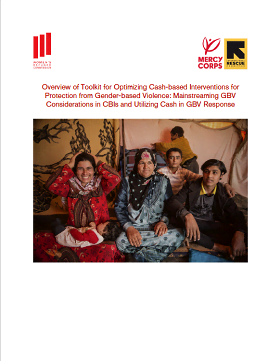
Toolkit for Optimizing Cash-based Interventions for Protection from Gender-based Violence
Guidelines and Tools
Efforts to prevent and respond to GBV should be a priority for all actors in all humanitarian response operations from the very start. By mainstreaming GBV considerations in CBIs throughout the program cycle and by utilizing cash within GBV case management services, cash can be optimized as a tool to enhance the protection of crisis- and conflict-affected populations and to mitigate risks of...
Thematic lead
Contenu récent

Pathways from CVA to long term financial inclusion: A framework for success
Blog Post
CVA programs can provide a springboard to financial inclusion. But spotting the right opportunity, and good programme design, are key. GSMA and Mercy Corps share a simple tool to understand which contexts offer the best pathways from CVA to financial inclusion.

Slides for the Global CWG meeting – Oct 2021
Presentation
The enclosed slides for the 28 October meeting feature presentations from WFP, the Uganda and CAR CWGs and GSMA , as well as key links to key resources discussed.
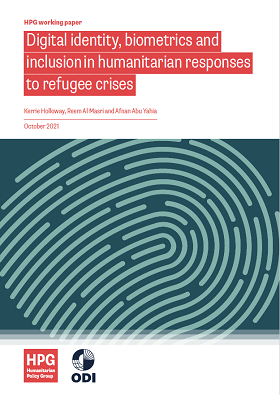
Digital identity, biometrics and inclusion in humanitarian responses to refugee crises
Report
Digital identity and biometrics have long been divisive topics in the humanitarian sector. On the one hand, they have the potential to be more inclusive and reach people in need at scale due to perceived efficiency gains. A legal identity for everyone as part of the Sustainable Development Goals (SDGs)...
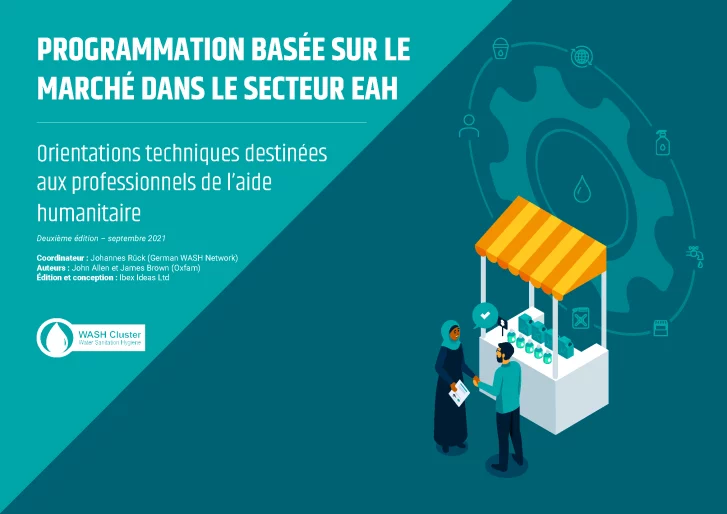
Programmation basée sur le marché dans le secteur EAH
Guides et outils
Le but de ce document est de fournir des conseils pratiques sur la programmation basée sur le marché (MBP) dans les réponses humanitaires WASH. Cette orientation est destinée à : Praticiens WASH humanitaires Praticiens travaillant avec les transferts monétaires et les marchés Équipes de soutien...

Transferts Monetaires Sensibles Au Genre: Directives pour opérationnaliser l’approche sur le terrain
Guides et outils
Ces directives se basent sur la pratique, la recherche, les témoignages au sujet des transferts monétaires et ont pour objectif d’aider à mettre en place ces modalités en prenant en compte les questions de genre tout au long du cycle du projet et au niveau de la réponse. Elles sont structurées en...

Cash and Voucher Assistance and Gender-Based Violence Compendium and Editable Risk Matrix Translations
Guidelines and Tools
This brief serves as a complementary document to the Cash & Voucher Assistance and Gender- Based Violence Compendium: Practical Guidance for Humanitarian Practitioners and is intended to be a reference guide delineating sections, features, and new tools. In addition, it provides the respective links to...

Gender Analysis of Livelihoods Programming and Individual, Household and Community Dynamics in Iraq
Report
Women throughout the world are constrained in their economic activities, and face major challenges trying to pursue better paid and more productive jobs, including in Iraq. Iraq is in a time of change after ISIS and in light of the pandemic. Though economic upheaval brings hardship, it also can open doors...
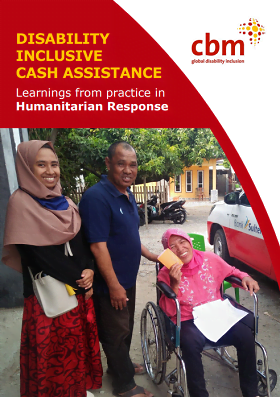
Disability Inclusive Cash Assistance: Learnings from Practice in Humanitarian Response
Guidelines and Tools
This case study collection describes lessons learned from seven inclusive humanitarian cash transfer projects implemented from 2015 – 2020 in Niger, Zimbabwe, Pakistan, Bangladesh, Philippines, and Indonesia, and five ongoing projects from the 2020 Covid-19 pandemic responses. This good practice...

We Don’t Do a Lot for Them Specifically
Report
Cash based assistance is a large part of government and NGO responses to social protection needs during the COVID-19 crisis. But is this assistance reaching people with diverse SOGIESC (aka LGBTIQ+ people). There are clear needs, borne of systemic discrimination, including loss of informal sector work,...

We Don’t Do a Lot for Them Specifically – Quick Guide
Report

Evaluation of the Cash Plus Project’s Contribution to Reducing Vulnerability amongst Adolescent Girls & Young Women to HIV in Turkana County
Case Study
The Cash Plus programme aimed to influence change in several factors that increase the vulnerability of AGYW to HIV in Turkana County. The project design promoted combination prevention programming. Biomedical, behavioural and structural interventions targeting AGYW were implemented over approximately...
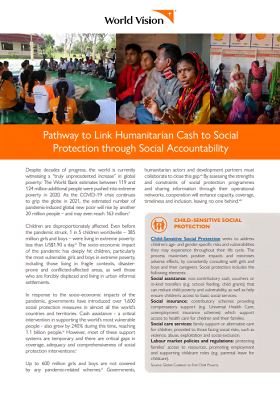
Transfers with Impact – Pathway to Link Humanitarian Cash to Social Protection through Social Accountability
Policy paper
In response to the socio-economic impacts of the pandemic, governments have introduced over 1,600 social protection measures in almost all the world’s countries and territories. Cash assistance – a critical intervention in supporting the world’s most vulnerable people – also grew by 240% during...

Les transferts monétaires dans la réponse à la pandémie de COVID-19 Leçons apprises d’un programme multi-pays de CARE
Rapport
CARE a mis en œuvre un programme multi-pays, dans le but de réduire les impacts négatifs de la COVID-19 sur les populations vulnérables, en particulier les femmes et les jeunes filles, en utilisant des approches complémentaires et multimodales, y compris les transferts monétaires aux populations...

Somalia CVA Case Study: Cash and Voucher Assistance and Gender-Based Violence Risk Mitigation
Report
In order to better understand the potential risks for women and girls that may be created by the provision of humanitarian cash assistance, Cash and Voucher Assistance (CVA) and Gender-Based Violence (GBV) experts from Somalia worked closely together to evaluate existing CVA interventions in Somalia and...

Minding the (financial and digital) gap! – How informal social safety nets leverage digital & cash enablers in COVID-19 pandemic
Presentation
Minding the (financial and digital) gap! – How informal social safety nets leverage digital & cash enablers in COVID-19 pandemic: In every context, strengthening the links between cash transfers, savings groups and digitisation contributes to resilient recovery from COVID-19. Representatives of...

Enablers and Gaps: Gender Equality, Gender-Based Violence Response and Mitigation in Cash and Voucher Assistance at Response levels: analysis on three case studies
Report
The Gender and Cash Sub-Workstream identified three case studies that illustrate how Cash Working Groups, GBV Sub-Clusters, gender focal points (e.g. Gender in Humanitarian Action Working groups at country and regional level) and humanitarian partnerships can enable meaningful and wider engagement on...
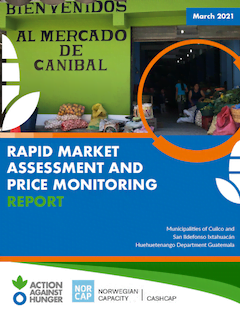
Rapid Market Assessment and Price Monitoring Report – Huehuetenango Department Guatemala
Report
Methodology: This rapid assessment of markets and prices was based on an adapted version of the IFRC’s Rapid Assessment for Markets, elements of the EMMA toolkit’s market system approach and the consortium of NGO’s price monitoring format. The methodology was chosen to give a basic and rapid...

Comparative study of the effects of different cash modalities on gender dynamics and people with disabilities in Aleppo, Syria
Report
In 2020/2021, the Syria Joint Response partners (ZOA, Oxfam, Cordaid, Dorcas and Terre des Hommes) completed a comparative research to showcase the different effects of different modalities on the most deprived and marginalised groups, in particular women and People With Disabilities (PWD) in order to...

Comparative study of the effects of different cash modalities on gender dynamics and people with disabilities in Aleppo, Syria – Executive summary
Report
In 2020/2021, the Syria Joint Response partners (ZOA, Oxfam, Cordaid, Dorcas and Terre des Hommes) completed a comparative research to showcase the different effects of different modalities on the most deprived and marginalised groups, in particular women and People With Disabilities (PWD) in order to...

User journeys of Syrian refugees receiving multi-purpose cash from WFP in Lebanon
Report
Ground Truth Solutions, in collaboration with the Cash Monitoring, Evaluation, Accountability and Learning Organizational Network (CAMEALEON) have produced a report detailing the lived experiences or “user journeys” of Syrian refugees in Lebanon receiving multipurpose cash assistance from the World...




